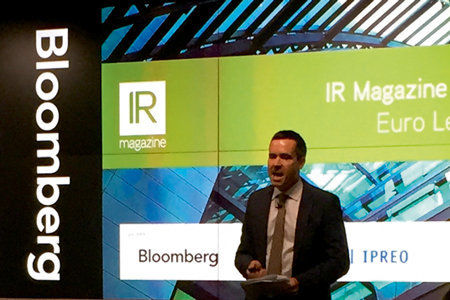IR Magazine Think Tank – Euro Leaders 2015 panelists tackled the changes taking place in corporate access
Please note: IR Magazine Think Tanks operate under the Chatham House rule. As a result, there is no attribution of anything said on the day unless permission is given by the speaker.
Corporate access and research remain hot topics and these issues, among others, were tackled by panelists in the first session of the day at the IR Magazine Think Tank – Euro Leaders 2015, where senior IR professionals gathered at Bloomberg’s London headquarters. 
IR Magazine’s editorial director Neil Stewart kicks off proceedings
The panelists agreed little has changed on the sell side so far, with the European Securities and Markets Authority still undecided on the final wording for its MiFID II regulation. Some in the room did say they were already feeling the pinch, however, while others offered a prediction for the future of brokers.
‘Research houses are having to think about the potential of pricing research, which is causing a lot of consternation – not because people don’t want to do it, but because it’s just such a difficult topic to look at and try to price,’ explained one panelist.
‘There’s an element of price discovery going on now at all sell-side brokers, whether boutiques or big banks, and the rest of the world is watching Europe.’
There are different solutions on the table, of course, with new tech options and platforms such as ingage, which is being trialed by one of the session’s attendees. ‘If I had to predict things,’ said this speaker, ‘I’d say there’s going to be much more done in-house, which means IROs liaising more with the buy side directly.’
There is an element of a ‘squeezed middle’, noted one panelist, who said large and mega-cap firms will always have access and coverage, while at the small and micro-cap level ‘there are some people doing great work with the private client brokers’. This leaves those at mid-cap level somewhat uncatered for. For IROs feeling sidelined, or simply looking to boost coverage, some advice was offered.
Going to market
One approach involves looking at the elements that influence research decisions. One-on-one meetings are, of course, up there, but there are also set pieces: results presentations, earnings calls, the annual report, the website. ‘These are things within our control as IROs,’ noted one panelist, who also offered tips on using marketing to boost your IR program:
- Look at perception through a marketing lens: ‘Understanding what your investors think about you through perception studies or other mechanisms, working out which investors like you and why – or working out that there are some investors that are never going to like you and maybe stop wasting your time with them’
- Run a campaign: ‘Marketers don’t look at what they do in terms of single events; they think about a campaign. You need to think about your engagement in the squeezed middle as a campaign, not just lurching from one event to another, one quarter to the next, which is quite easy to do’
- Think about adapting the messaging and the medium for different audiences: ‘IR is about so much more than just issuers and an investor.’
Before moving on to other topics, think tank moderator Neil Stewart, IR Magazine’s editorial director, asked the panel whether the corporate access and research changes spread beyond Europe. ‘If Europe is going to come down and be draconian on research I think you’re more likely to see Asia follow because of the historic links it has with this time zone,’ said one panelist, adding that active legislation would be needed to make any similar changes in the US, where the SEC is more concerned about what goes on inside a one-on-one meeting anyway.
The corporate access and research discussion was followed by debate on quarterly reporting and feedback, with one panelist commenting: ‘If we as IROs want to be part of the C-suite, we have to take on the responsibility of delivering difficult messages.’










